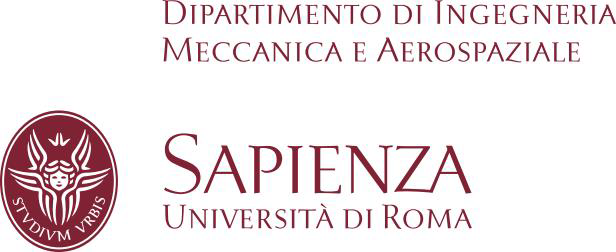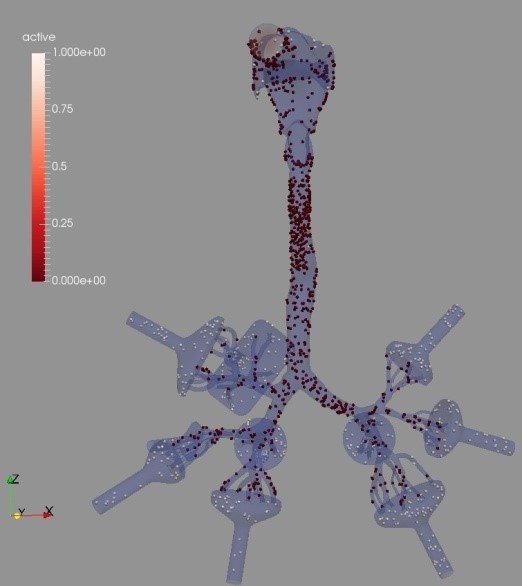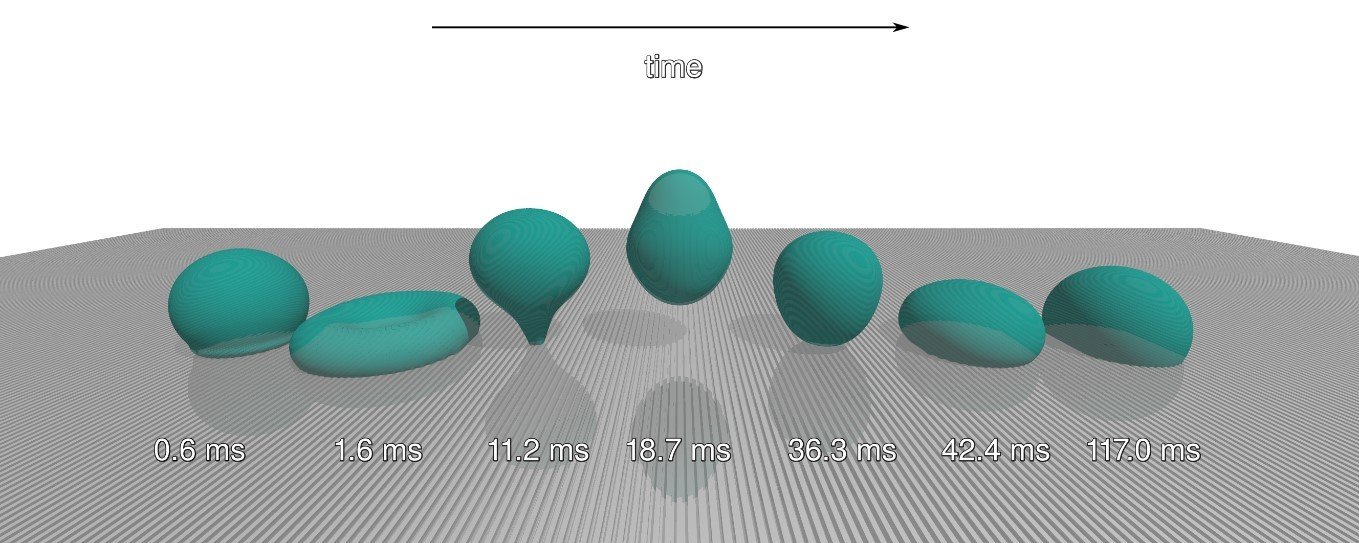Best Practice Guidance Course



CFD for Dispersed Multi-Phase Flows 2021 with Problem Shooting Session
4th - 5th October 2021
Sapienza Università di Roma
Faculty of Civil and Industrial Engineering (Facoltà Ingegneria Civile e Industriale)
Via Eudossiana 18; 00184, Rome, Italy
Lecture Hall: We will put indications for reaching the room in the Faculty hall.
- Prof. Dr.-Ing. Martin Sommerfeld - Multiphase Flow Systems, Otto-von-Guericke University Magdeburg, Germany
- Prof. Dr. Olivier Simonin - Institut de Mécanique des Fluides de Toulouse(IMFT) Toulouse, France
- Dr.-Ing. Martin Wörner - Karlsruhe Institute of Technology (KIT), Karlsruhe, Germany
- Prof. Vincenzo Armenio Ph.D - Dept of Engineering and Architecture, University of Trieste, Italy
- Dr. Paolo Venturini, Ph.D - Dept. of Mechanical and Aerospace Engineering, Sapienza Università di Roma, Italy
- Prof. Domenico Borello, Ph.D, - Dipartimento di Ingegneria Meccanica e Aerospaziale, Università di Roma La Sapienza, Italy
Access to the University procedure due to Covid-19:
- Participants must have a valid EU Digital COVID Certificate (https://ec.europa.eu/info/live-work-travel-eu/coronavirus-response/safe-covid-19-vaccines-europeans/eu-digital-covid-certificate_en)
- They must fill the daily authorisation form available at https://www.uniroma1.it/en/notizia/covid-19-phase-2-procedures-students-staff-and-guests (list of participants will be delivered to the people in charge of checks)
- If participants arrive from foreign countries they must comply with the requirements for travellers to Italy: Covid-19, travellers (salute.gov.it)
Please contact ERCOFTACCADO for registration !
Registration:
Please contact ERCOFTAC CADO: admin@cado-ercoftac.org
Registration Fees(reduction of 50 € applies to ERCOFTAC members):
Each delegate will receive a free copy of the book BPG CFD for Dispersed Multiphase Flows; lunches and coffee breaks are included.
- Industry: 650 €
- Academia: 450 €
- PhD Students: 300 €
Please note course fees do NOT include accommodation
All locally valid contact restrictions as a consequence of the Corona Virus have to be respected during the course. The requirements on the size of the lecture room are respected. We appreciate your understanding and your support.
PROGRAMME
Monday, 4th October 2021
| 8:30 | Registration and Coffee |
| 8:45 | Introduction to the course; Characterisation of multiphase flows (30 min) - Martin Sommerfeld (OvGU) |
| 9:15 | Numerical methods for multi-phase flow (45 min) - Martin Wörner (KIT) |
| 10:00 | Numerical methods for multi-phase flow (Lattice-Boltzmann Method) (30 min) - Martin Sommerfeld (OvGU) |
| 10:30 | Refreshments (30 min) |
| 11:00 | Industrial challenges and needs for the application of CFD to industrial dispersed multiphase flows (60 min) - Olivier Simonin (IMFT) |
| 12:00 | Lunch (60 min) |
| 13:00 | Forces on particles, droplets and bubbles (60 min) - Martin Sommerfeld (OvGU) |
| 14:00 | Euler/Lagrange method, fundamentals, implementation and coupling (60 min) - Martin Sommerfeld (OvGU) |
| 15:00 | Refreshments (30 min) |
| 15:30 | Numerical simulation of erosion/deposition in rotating turbomachinery (45 min) - Paolo Venturini (SUdR) |
| 16:15 | Modelling non-spherical particles behaviour in dispersed multi-phase flow (45 min) - Martin Sommerfeld (OvGU) |
| 17:00 | Q & A (30 min) |
Tuesday, 5th October 2021
| 8:30 | Continuum Multi-Fluid approach, different modelling levels, particle-laden flows (60 min) - Olivier Simonin (IMFT) |
| 9:30 | Multi-Fluid (Euler/Euler) approach, liquid-gas, bubbly flows (60 min) - Martin Wörner (KIT) |
| 10:30 | Refreshments (30 min) |
| 11:00 | Multiphase models for flow cavitation (45 min) - Vincenzo Armenio (SUdR) |
| 11:45 | Resolved numerical simulations for small-scale processes and model development (45 min) - Martin Wörner (KIT) |
| 12:30 | Lunch (60 min) |
| 13:30 | Modelling elementary processes in dispersed multi-phase flows (solid particles, spray droplets and bubbles) (60 min) - Martin Sommerfeld (OvGU) |
| 14:30 | Coupling of flow and discrete particle method; CFD/DEM Simulations (60 min) - Olivier Simonin (IMFT) |
| 15:30 | Refreshments (30 min) |
| 16:00 | Test case calculations and examples of application (30 min); Summary of available test cases, channels, jets, sprays, fluidised beds - ALL |
| 16:30 | Problem shooting session, presentations from participants (90 min); (Registration required, please submit your proposal, we will try our best to help solving your problem) - ALL |
| 18:00 | Closure |
Multiphase Flows Rationale
The simultaneous presence of several different phases in external or internal flows such as gas, liquid and solid is found in daily life, environment and numerous industrial processes. These types of flows are termed multiphase flows, which may exist in different forms depending on the phase distribution, such as separated and dispersed systems. Examples are gas-liquid transportation, crude oil recovery, circulating fluidized beds, sediment transport in rivers, pollutant transport in the environment and atmosphere, fine particle separation, cloud formation, fuel injection in engines, bubble column reactors and sprays for food processing, to name only a few. As a result of the interaction between the different phases such flows are rather complicated and very difficult to describe theoretically.
Consequently, the numerical calculation of multiphase flow systems based on CFD methods also comprises a multitude of different numerical methods each applicable to certain types of multiphase flows and resolving different length and time scales of the problem. The present course focusses on numerical simulations of dispersed multiphase flows and the required modelling of particle-scale phenomena. The hierarchy of available numerical techniques for the different scales in multiphase flows (i.e. particle-scale and industrial-scale simulations) is presented. Both the well-known Euler/Euler and Euler/Lagrange approach, suitable for large-scale simulations of industrial processes, are introduced in detail. Required modelling for particle-scale transport phenomena is presented and the use of particle-resolved direct numerical simulations for their development is emphasised. Examples of a number of advanced models are presented and their effects on large-scale processes are highlighted.
This course is rather unique as it is one of few in the community that is specifically designed to deliver:
a) best practice guidance
b) the latest trends in CFD for dispersed multi-phase flows
c) many application examples
The course appeals to researchers and engineers involved in projects requiring CFD
for turbulent dispersed multi-phase flows with bubbles, drops or particles.
Moreover, delegates are offered the opportunity to present their work via 10 minute presentations (problem-shooting session), thereafter, the lecturers can offer prospective solutions. Registration is required: martin.sommerfeld@ovgu.de
Example of Multiphase Flow Simulations


Euler/Lagrange results for particle deposition
in a lung model (dark particles: deposited;
grey particles: still active particles, MPS-OvGU 2020)
Instantaneous wall solids concentration
from a 3D Euler-Euler unsteady simulation
of a chemical looping combustion pilot
built at SINTEF Energy Research and
consisting of two fluidized beds interconnected
with a lifter (IMFT, Toulouse, 2020)
Interface-resolving simulation of the impact/rebound
of a drop on/from a surface with micro-grooves (KIT, Karlsruhe, 2018)

